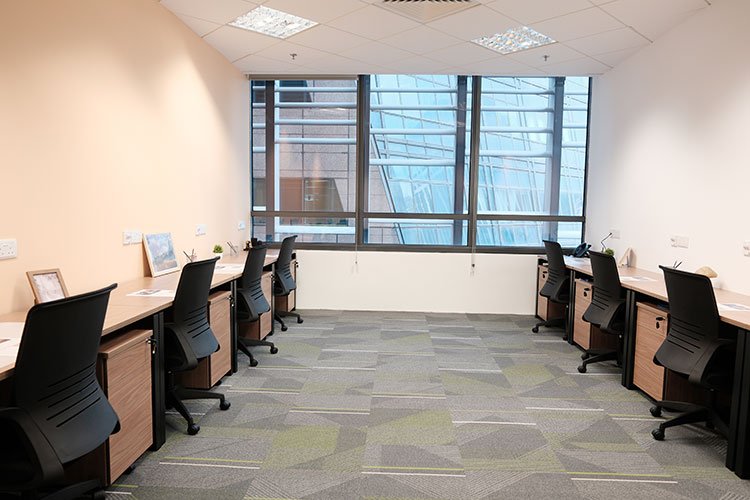In the modern business environment, the choice of office space is becoming increasingly diverse. Serviced offices and co-working offices are two popular office models, each with its own characteristics. Whether it is a start-up, a small or medium-sized company, or a branch of a large enterprise, it is necessary to make a suitable choice between these two models based on its own needs. Next, we will conduct a comprehensive analysis of these two office types.

Definition and core concepts
Serviced Office
Serviced office is a highly customized office solution, usually managed and operated by professional operators. It is rented out in units of complete office space, covering basic office furniture such as desks and chairs, filing cabinets, high-speed networks, telephone systems and other communication equipment, and even a series of supporting services such as front desk reception, cleaning, and security. The core of serviced office is to provide enterprises with a “one-stop” office environment. Enterprises can start business immediately after moving in, without having to worry about the basic construction and operation management of the office space
Coworking
Coworking is a shared office space model that breaks the closed nature of traditional office space and emphasizes the sharing of space and resources. In a coworking space, different companies, teams or individuals share the same physical space. In addition to their own independent workstations or small offices, they also share public areas such as meeting rooms, rest areas, tea rooms, and printing areas. Coworking focuses on creating a community atmosphere, and by organizing various social activities and industry exchanges, it promotes interaction and cooperation among members, forming a vibrant and innovative office ecosystem.
Comparison between serviced offices and coworking spaces

Space layout and privacy
It is suitable for enterprises with higher requirements for information confidentiality, such as financial institutions, law firms, etc. Whether it is an open office or an independent compartment, it can meet the needs of different office scenarios.
The layout of the joint office space is more flexible and diverse, with both open shared workstations and small independent offices. Open shared workstations provide low-cost office options for individuals or small teams, but the privacy is relatively weak; although independent offices have a certain degree of privacy, they may not be as good as independent offices in serviced offices in terms of space area and sound insulation. Joint offices are more suitable for creative enterprises, start-up teams or freelancers who pursue open communication and focus on social atmosphere
Service content and supporting facilities
Serviced offices provide more comprehensive and detailed services. In addition to basic office facilities and property services, they may also include administrative support services, such as mail delivery, meeting arrangements, hotel and air ticket booking, etc.; IT technical support, such as network maintenance, equipment repair, etc.; and business services, such as legal consulting, tax agency, etc.
Joint office spaces also provide a wealth of supporting facilities, such as high-speed wireless networks, multi-functional meeting rooms, shared printers, and leisure coffee areas. At the same time, joint office operators usually organize various community activities, such as industry lectures, entrepreneurship sharing sessions, holiday parties, etc., to enhance the connection and interaction between members. However, in terms of professional business services and personalized services, joint offices may be relatively weak.
Cost and flexibility
The rent of serviced offices is relatively high, but its fees usually include all service and facility costs, so companies do not need to bear additional operating costs. At the same time, the lease period of serviced offices is relatively flexible, and companies can choose short-term or long-term leases according to their own development needs. However, compared with co-working offices, the flexibility of rent adjustment may be slightly inferior.
A major advantage of co-working is its low cost, especially for open shared workstations, the rent is much lower than traditional office space and serviced offices. In addition, the lease period of co-working offices is very flexible, ranging from a few days to several years. Companies can adjust the size and lease period of office space at any time according to their own business development, which is extremely flexible, which is very attractive to start-ups and small teams.
Target customer groups
Serviced offices are mainly for medium and large enterprises, branches of multinational companies, and enterprises with high requirements for office environment and service quality. These enterprises pay more attention to the stability, privacy and professionalism of office space, and are willing to pay higher fees for high-quality office environment and comprehensive services.
Joint offices have attracted many start-ups, entrepreneurial teams, freelancers and small creative companies. These groups usually have limited budgets and hope to reduce office costs by sharing resources. At the same time, they are also eager to communicate and cooperate with other entrepreneurs in an open environment to obtain more development opportunities and inspiration.
How to choose the right office type?

Choosing a serviced office or a coworking office requires comprehensive consideration of the company’s actual situation and development needs. If the company has high requirements for the privacy, security and professionalism of the office space, has a relatively sufficient budget, and hopes to obtain a full range of one-stop services, then a serviced office may be a better choice; if the company pays more attention to low cost, flexibility and social atmosphere, pursues an open and innovative office environment, and hopes to communicate and cooperate with people from different industries, a coworking office is more suitable
In the actual decision-making process, companies can also conduct on-site inspections of different office spaces to understand their specific facilities, services and atmosphere, and fully communicate with operators in order to make the most appropriate choice for their own interests. Both serviced offices and coworking offices provide modern enterprises with a variety of office solutions, helping them to develop efficiently in the fierce market competition.
-180x58.png)